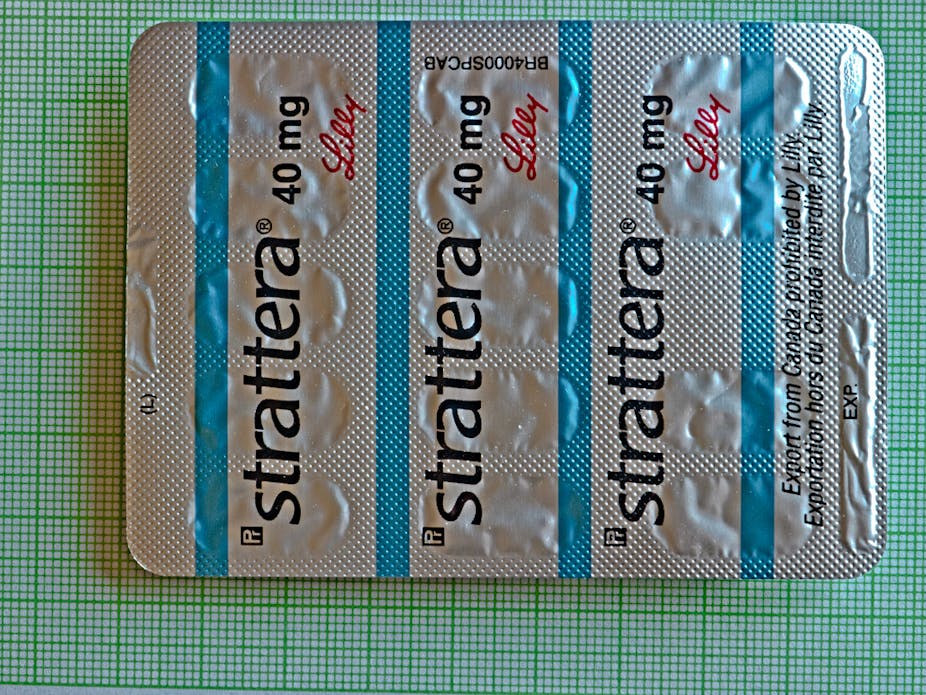The Therapeutic Goods Administration has warned that an attention-deficit hyperactivity disorder drug, Strattera (atomoxetine), is linked to an increased heart rate and blood pressure in some patients.
The TGA advises people taking the ADHD drug to neither stop taking Strattera, nor to alter their dose without first consulting their doctors. People with high blood pressure, fast heart rates, heart disease, who have had a stroke, or who have been diagnosed with a heart condition known as QT prolongation are advised to discuss with their doctors the monitoring of their cardiovascular systems while on atomoxetine.
Developed by pharmaceutical giant Eli Lilly, atomoxetine was originally intended to be an antidepressant but after tests failed to show sufficient benefits it was successfully tested for treatment of ADHD.
It has now found its market as a non-amphetamine, non-stimulant drug for ADHD, recommended for six-year-olds and up, and Strattera sales have been growing strongly. Pharma Times reported last month that Eli Lilly’s third-quarter sales of Strattera were up 20 per cent on the previous quarter, to US$152 million ($148 million).
Yet, given the non-amphetamine nature of atomoxetine, the blood pressure and heart rate notification raised some eyebrows. Jon Jureidini, professor of psychiatry at the University of Adelaide, said of Strattera, “This is actually a failed antidepressant, so this [safety advisory] is a bit of a surprise, really.”
Professor Jureidini said that the public should take pharmaceutical companies’ claims with a grain of salt. “Historically most things that we’re told aren’t stimulants, opiates, whatever, end up being more like those drugs than they market themselves as being in the first place,” he said.
As for the idea that even very young children should be taking such drugs, Professor Jureidini said that “except in exceptional circumstances, it’s strange to be giving six-year-olds any kind of psychotropic drugs. But it’s an increasing trend with some pretty nasty drugs like anti-psychotics.”
“It’s a trend we should resist, but it’s become mainstream in Europe and the US; a guideline came out last month from the American Academy of Pediatrics really pushing the line of medicating kids from the age of four up, which is a real worry,” Professor Jureidini said.
If parents find that their children have been diagnosed with ADHD due to their being inattentive or readily distracted, they should “try to find a better explanation,” Professor Jureidini said.
“More or less every kid I see who is said to have ADHD, when he comes in with the family, we can always come up with a better way of understanding what’s happening than running with ADHD,” he said.
The Federal Government has reported that more than 350,000 children and adolescents in Australia are estimated to have ADHD.
The Government’s National Health and Medical Research Council suspended final approval of the Royal Australasian College of Physicians’ draft guidelines on ADHD, since it “became aware of a formal investigation in the United States into conflict of interest allegations made about a leading US researcher in ADHD whose work is referenced in the draft RACP Guidelines”.
The “leading US researcher” was Harvard University’s Professor Joseph Biederman. The New York Times described him as “a world-renowned Harvard child psychiatrist whose work has helped fuel an explosion in the use of powerful antipsychotic medicines in children.”
A US senator’s inquiry revealed that Professor Biederman had received at least US$1.6 million ($1.53 million) from drug companies, but only reported US$200,000 ($1.92 million) of this to Harvard.
Pediatrician Daryl Efron, the chair of the committee that incorporated Professor Biederman’s research into the draft Australian guidelines for ADHD, resigned in 2007 after his links to drug companies were publicised.
It emerged that Dr Efron was on the advisory boards of Eli Lilly as well as Novartis, manufacturers of Ritalin which is widely prescribed for ADHD.
The draft guidelines advise a multimodal approach, and state that “not all people with ADHD will require pharmacological treatment.”
They draft guidelines also advise that “medication should not be used as first-line treatment for ADHD in preschool-aged children.”
Atomoxetine should be considered for children, adolescents and adults “with severe ADHD who do not respond to or are intolerant of stimulant medication, or in whom stimulant medication is contraindicated,” the draft guidelines advise.

